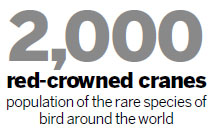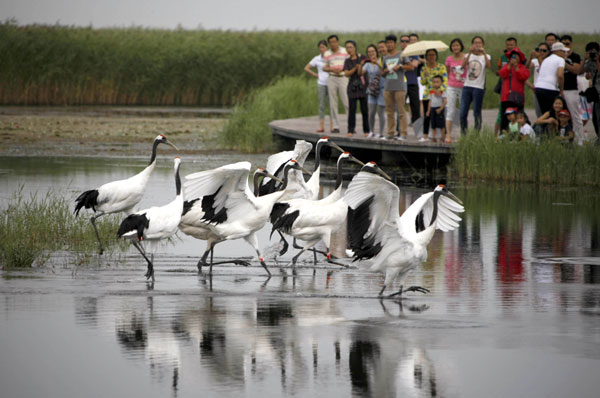5,000 villagers face relocation to save endangered red-crowned cranes
By Xinhua in Harbin (China Daily) Updated: 2014-08-26 06:53More than 5,000 people are to be relocated to protect a colony of red-crowned cranes, an endangered species with a worldwide population of only 2,000.
The bird is an important symbol in Chinese mythology, representing longevity and immortality. A common image in Chinese art depicts a hermit or reclusive scholar who cultivates bamboo and looks after cranes.
Zhalong National Nature Reserve in Heilongjiang province, which covers 210,000 hectares, is China's largest artificial breeding center for the cranes and home to 20 percent of the global population.
|
Red-crowned cranes attract tourists at Zhalong National Nature Reserve in Qiqihar, Heilongjiang province, this month. The province is a major breeding place of the bird. Chen Hao / For China Daily |
Local people have traditionally made a living from fishing or selling reeds. However, human activity seriously affects the birds. The reserve's environment is deteriorating and people are taking the cranes' food.
In March 2005, fire broke out while farmers were reclaiming land, destroying much of the area's marshy grassland. Fortunately no birds died.
According to Wang Wenfeng, a manager at the reserve, the only way to stop the damage to the environment is by moving the villagers out - all 5,396 of them.
More than 160 million yuan ($26 million) has been earmarked for the project, and the search is on for land where the villagers can be resettled.
The first group is due to move out before winter next year. It is not known when the last party will move.
"Several decades ago, the water was clean," said Jia Huifang from Zhalong. "Fish and birds were abundant. We were not worried about our lives.

"But now the water level has dropped and the fish are gone. Making a living is harder than before."
Most villagers support the relocation project, but are worried about the future.
"Our children need schools and our parents need hospitals, that is why we want to move," Jia said. "But what shall we live on if we leave this land?"
The local government's solution is tourism - it plans to promote bird-watching and build a spa.
Guan Zhixin, the Party chief at Halawusu village, said 4.16 hectares of land have been allocated for more than 900 villagers.
"In three years we will build a spa town that will provide 700-plus jobs," he said.
- Govt encourages people to work 4.5 days a week
- Action to be taken as HIV cases among students rise
- Debate grows over reproductive rights
- Country's first bishop ordained in 3 years
- China builds Tibetan Buddhism academy in Chengdu
- Authorities require reporting of HIV infections at schools
- Typhoon Soudelor kills 14 in East China
- Police crack down on overseas gambling site
- Debate over death penalty for child traffickers goes on
- Beijing to tighten mail security for war anniversary








